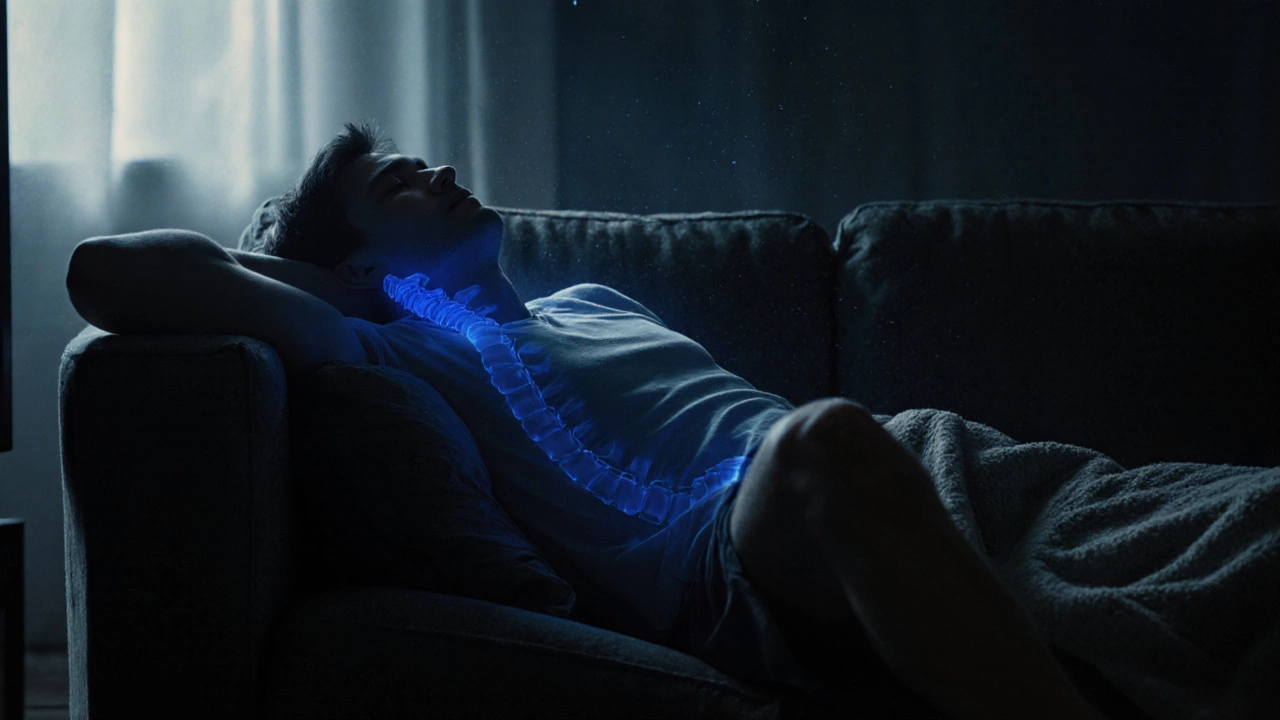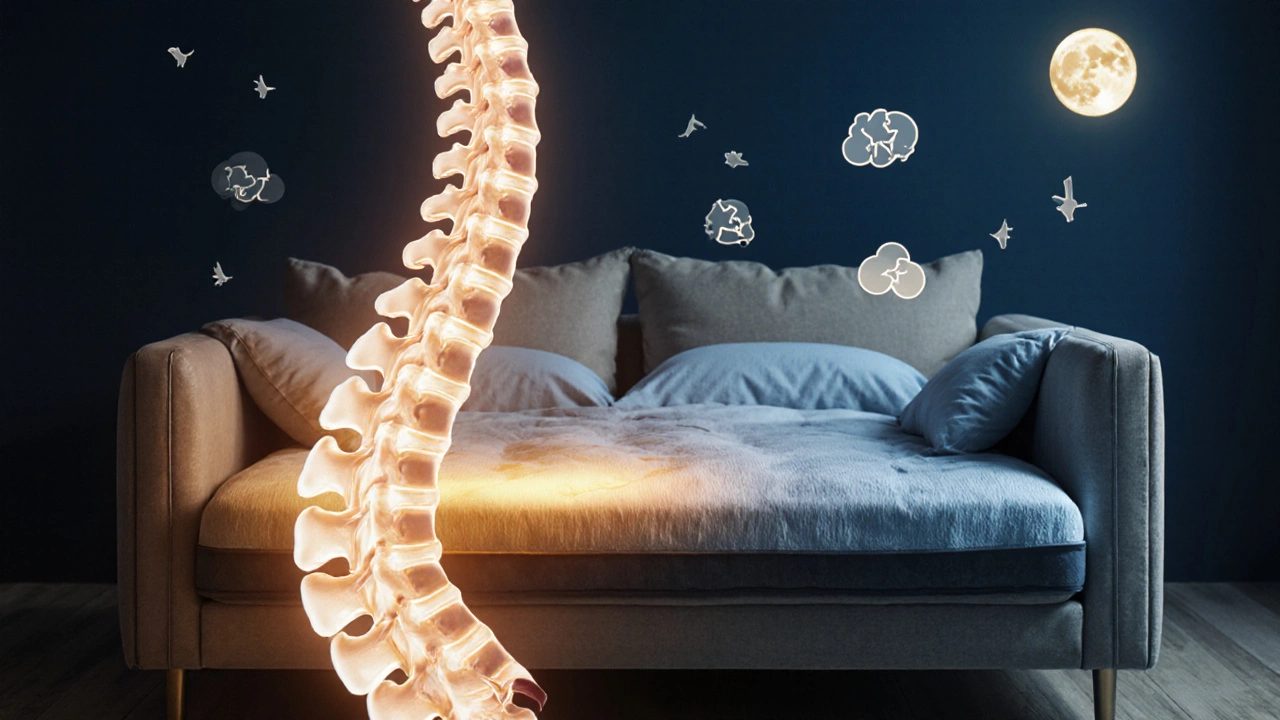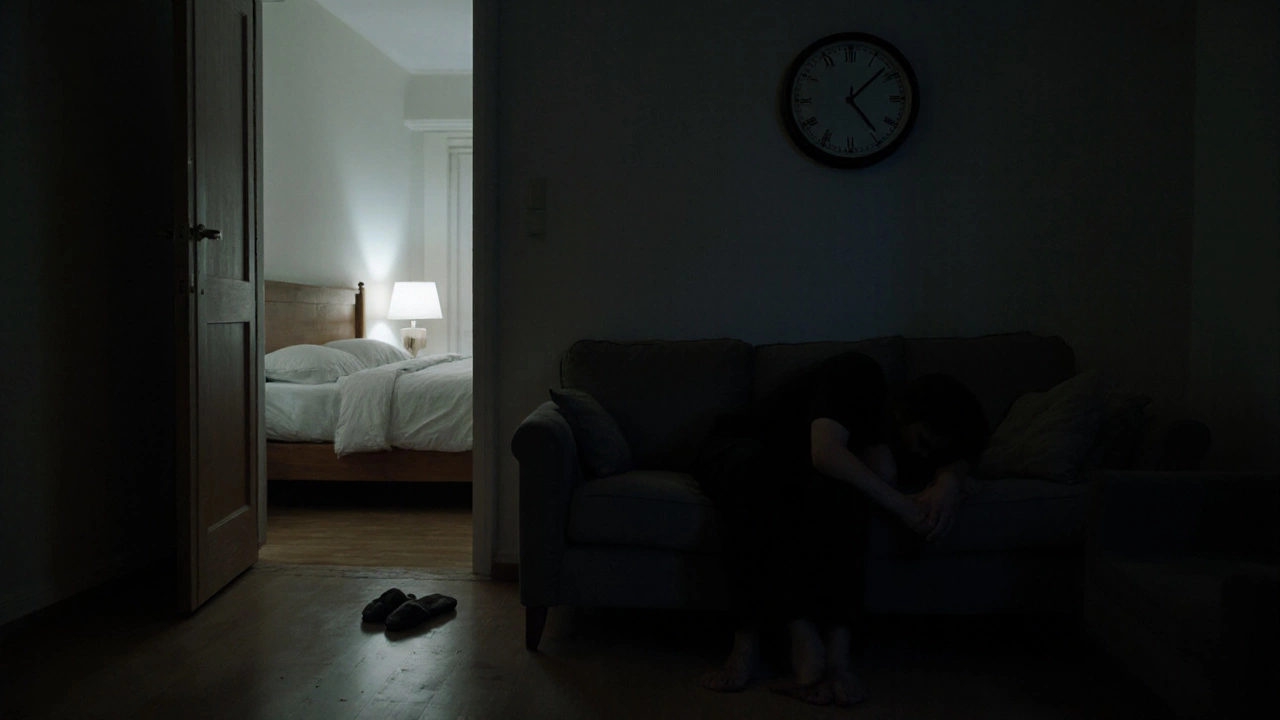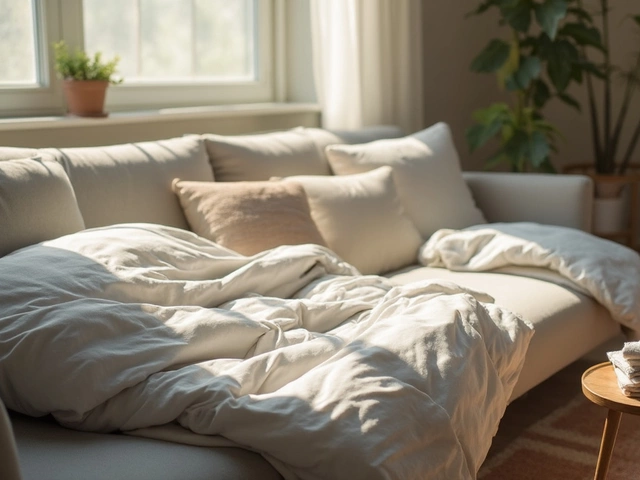
Couch Sleep Impact Calculator
How Much Is Your Couch Sleeping Hurting You?
Enter your sleep habits to see your risk of back pain, poor sleep quality, and disrupted rhythms.
You’ve had a long day. The TV’s on, the blanket’s warm, and before you know it, your eyes are heavy. You tell yourself, "Just five minutes," but you wake up hours later with a stiff neck, a sore back, and a headache. Sound familiar? Falling asleep on the couch isn’t just uncomfortable-it’s actively hurting your sleep quality and your body.
Your spine isn’t designed for couch sleeping
Your couch isn’t made to support your spine the way a mattress is. Most couches sink in the middle, forcing your lower back into an unnatural curve. Your neck twists to one side, your hips sag, and your legs dangle. This isn’t relaxation-it’s spinal misalignment. A 2023 study from the New Zealand Spine Research Institute found that 68% of people who regularly slept on couches reported chronic lower back pain within six months. The problem isn’t just the couch. It’s that your body doesn’t get the support it needs to recover overnight.
You’re not getting real sleep
Sleeping on the couch doesn’t mean you’re sleeping well. You’re likely stuck in light sleep, never reaching deep or REM cycles. Why? Because your body is fighting discomfort. Every time you shift, your brain wakes up a little. Your heart rate doesn’t drop. Your muscles don’t fully relax. You might think you’re rested because you were "asleep," but your brain remembers the struggle. People who sleep on couches regularly take 30% longer to fall asleep and wake up 2-3 times more often than those who sleep in bed, according to sleep tracking data from over 12,000 users in Wellington and Auckland.
It messes with your circadian rhythm
Your body keeps time using light, temperature, and routine. Sleeping on the couch breaks that rhythm. You’re probably watching TV in low light, surrounded by noise, and sleeping at odd hours. That tells your brain it’s not nighttime. Over time, this confuses your melatonin production. You start feeling tired during the day and wide awake at night-even if you "slept" for eight hours. A 2024 sleep survey in New Zealand showed that couch sleepers were 2.4 times more likely to report daytime fatigue than those who slept in their beds.

It trains your brain to associate the couch with sleep
Your brain loves patterns. If you sleep on the couch every Friday night, your brain starts thinking, "Couch = sleep." That’s great if you’re using a sofa bed. But if you’re just collapsing on the living room sofa, you’re weakening the connection between your bed and sleep. Soon, when you actually get into bed, your brain says, "Wait, this isn’t where I nap." That’s why insomniacs are told to only use their bed for sleep and sex. The same rule applies here. If your couch is your sleep zone, your bed becomes useless.
Sofa beds are the exception-not the rule
Not all couches are created equal. A proper sofa bed with a firm, flat mattress designed for overnight use is different. These have supportive springs, proper thickness, and a frame that keeps your spine aligned. But most "couch-to-bed" conversions are flimsy. They’re thin foam pads that collapse under your weight. If you’re using a sofa bed, check the mattress thickness-anything under 10 cm isn’t enough for full-time use. Look for models with pocket springs or memory foam layers. Brands like IKEA’s FRIHETEN or Sleep Republic’s Sofa Bed series are built for nightly use, not just weekend naps.

What to do instead
If you’re falling asleep on the couch because you’re too tired to make it to bed, fix the root cause-not the couch. Try these simple changes:
- Turn off screens 30 minutes before bed. Blue light delays melatonin by up to 90 minutes.
- Keep your bedroom cool-around 18°C is ideal for deep sleep.
- Use a consistent bedtime-even on weekends.
- If you’re reading or relaxing on the couch, get up and go to bed when you feel sleepy. Don’t wait until you’re half-asleep.
- Invest in a small, firm cushion for your lower back if you must sit up late.
It’s not about being perfect. It’s about giving your body a real chance to rest. Your spine, your brain, and your sleep quality will thank you.
When it’s okay to sleep on the couch
There are exceptions. If you’re sick and the couch is closer to the bathroom. If you’re recovering from surgery and your bed is too hard. If you’re traveling and your hotel bed is uncomfortable. Temporary use is fine. But if it’s become your regular habit, it’s a red flag. Your body isn’t getting the rest it needs-and you’re paying for it in pain, fatigue, and poor sleep quality.
The bottom line
Falling asleep on the couch feels easy in the moment. But the cost is real: back pain, broken sleep cycles, and a weakened sleep routine. Your bed exists for a reason. It’s designed to support you while you recover from the day. Don’t let your couch steal that. Make the switch, even if it’s just one night at a time. Your body will notice the difference before you even realize it.
Is it bad to sleep on the couch every night?
Yes. Sleeping on the couch every night leads to chronic poor posture, disrupted sleep cycles, and long-term back and neck pain. Couches don’t provide the spinal support your body needs for restorative sleep. Over time, this can cause lasting damage to your musculoskeletal system.
Can a sofa bed replace a regular bed?
Only if it’s designed for nightly use. Look for a sofa bed with a mattress that’s at least 10 cm thick, has pocket springs or high-density memory foam, and a sturdy frame. Many sofa beds are meant for occasional guests and will break down or cause discomfort if used daily. Check the manufacturer’s guidelines-some explicitly say "not for daily use."
Why do I feel more tired after sleeping on the couch?
You’re not getting deep or REM sleep. The couch forces your body into uncomfortable positions, causing constant micro-awakenings. Your brain stays in light sleep mode, trying to adjust your posture. Even if you slept for 8 hours, your body didn’t get the recovery it needed. That’s why you wake up more exhausted than when you went to sleep.
Does sleeping on the couch affect my partner’s sleep?
Yes. If you’re sleeping on the couch because your partner snores or moves a lot, you’re avoiding the real issue. You might think you’re getting better sleep, but you’re also breaking your shared sleep routine. Over time, this can strain your relationship and make it harder to sleep together again. Address the root cause-like using earplugs or a white noise machine-instead of avoiding the bed.
How do I stop falling asleep on the couch?
Start by creating a wind-down ritual. 30 minutes before bed, turn off screens, dim the lights, and move to your bedroom. Keep a book or calming music there. If you feel sleepy on the couch, get up and walk to bed-even if you’re tired. Your brain needs to relearn that bed = sleep. It takes about 2-3 weeks, but your sleep quality will improve dramatically.



